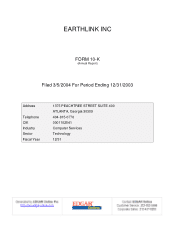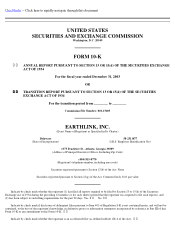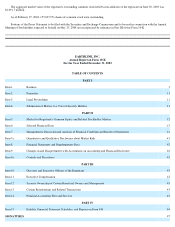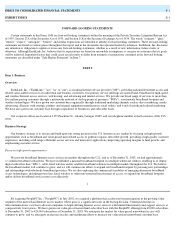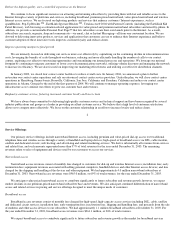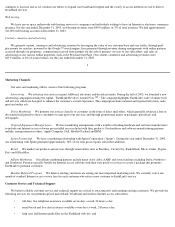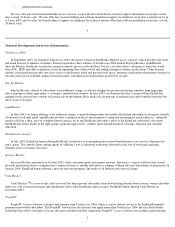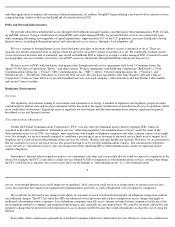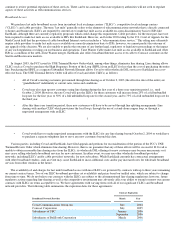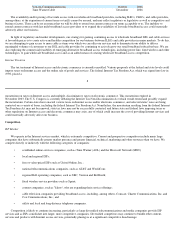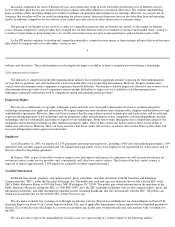Earthlink 2003 Annual Report Download - page 9
Download and view the complete annual report
Please find page 9 of the 2003 Earthlink annual report below. You can navigate through the pages in the report by either clicking on the pages listed below, or by using the keyword search tool below to find specific information within the annual report.
continue to review potential regulation of these services. There can be no assurance that state regulatory authorities will not seek to regulate
aspects of these activities as telecommunications services.
Broadband Access
We purchase last mile broadband access from incumbent local exchange carriers ("ILECs"); competitive local exchange carriers
("CLECs"); and cable providers. The term "last mile" generally refers to the element of telecommunications networks that is directly connected
to homes and businesses. ILECs are required by current law to make last mile access available on a non-discriminatory basis to ISPs like
EarthLink, although there are currently regulatory proposals which could change this requirement. Cable providers, for the most part, have not
been required to make last mile access available to ISPs like EarthLink. However, an October 2003 ruling by the U.S. Court of Appeals for the
Ninth Circuit held that the provision of cable broadband Internet services includes a "telecommunications service." This ruling may ultimately
require cable providers to make last mile access available on a non-discriminatory basis to ISPs; however, we cannot predict the outcome of
any appeals of this decision. We are also unable to predict the outcome of any further legal, regulatory or legislative proceedings or the impact
of any such regulations or rulings on our business and operations. Time Warner Cable makes last mile access available to EarthLink and other
ISPs as a condition of the AOL-Time Warner merger. EarthLink also offers broadband Internet access over cable to Comcast customers in the
Seattle and Boston area markets.
In August 2003, the FCC issued its UNE Triennial Review Order which, among other things, eliminates line sharing. Line sharing allows
CLECs such as Covad to purchase the High Frequency Portion of the Loop (HFPL) from an ILEC for less than the cost of purchasing the entire
line. Purchasing the HFPL as a separate Unbundled Network Element allows Covad to offer wholesale DSL services to EarthLink on a cost-
effective basis. The UNE Triennial Review Order will affect Covad (and other CLECs) as follows:
• All of Covad's existing customers provisioned through line sharing as of October 2, 2003 (the effective date of the order) are
"grandfathered" indefinitely at current rates, terms and conditions.
• Covad may also sign up new customers using line sharing during the first year of a three year transition period, i.e., until
October 2, 2004. However, the rate Covad will pay the ILECs for these customers will increase from 25% of a full unbundled
loop rate for the first year, to 50% of a full unbundled loop rate for the second year, and to 75% of a full unbundled loop rate for
the third year.
• After this three year transition period, these new customers will have to be served through line splitting arrangements (line
sharing with another CLEC which provisions the local loop), through the use of a stand-alone copper loop, or through a
negotiated arrangement with an ILEC.
7
• Covad would have to make negotiated arrangements with the ILECs for any line sharing beyond October 2, 2004 or would have
to purchase a separate telephone line to serve any new customers beyond this date.
Various parties, including Covad and EarthLink, have filed appeals and petitions for reconsideration of the portion of the FCC's UNE
Triennial Review Order which eliminates line sharing. However, there is no guarantee that any of these efforts will be successful. If Covad is
unable to obtain reasonable line sharing rates from the ILECs, its wholesale DSL offerings for new customers may become uneconomic or it
may cease selling wholesale broadband services for new customers. In either event, we may use other wholesale broadband providers'
networks, including ILECs' and/or cable providers' networks, for new subscribers. While EarthLink currently has contractual arrangements
with other broadband vendors, such an event may cause EarthLink to incur additional costs and/or pay increased rates for wholesale broadband
services from other vendors in the future.
The availability of and charges for last mile broadband access with most ILECs are governed by contracts with up to three years remaining
on current contract terms. Two of our ILEC broadband providers set availability and prices based on tariffed rates, which are subject to change
from time to time. We do not believe our contracts with the ILECs are subject to the aforementioned line-sharing regulations; however, future
regulatory actions regarding line-
sharing as well as the competitive environment may adversely affect our ability to extend or renew our current
contracts with ILECs on terms acceptable to us. We have agreements with varying terms with all of our significant CLECs and broadband
network providers. The following table summarizes the expiration dates for these agreements:
Contract Expiration
Broadband Network Provider
Month
Year
Covad Communications Group, Inc.
July
2004
Comcast Corporation
July
2005
Subsidiaries of SBC January
September
2006
2006
Subsidiaries of BellSouth Corporation
March
2006

